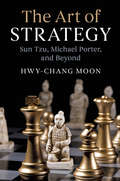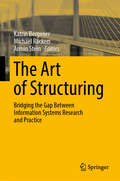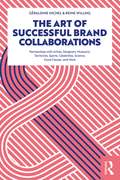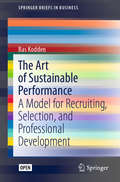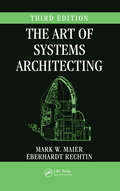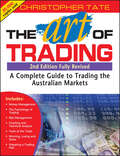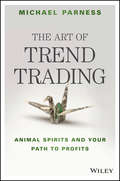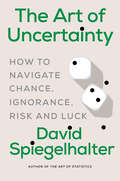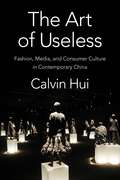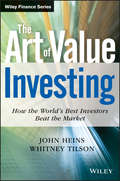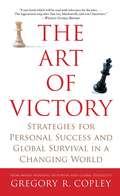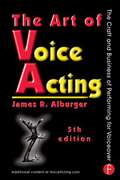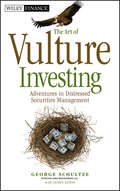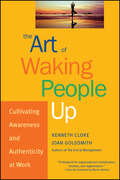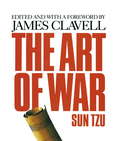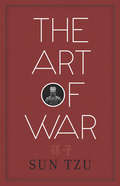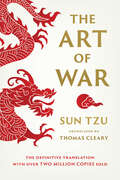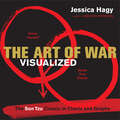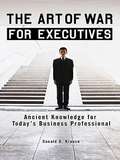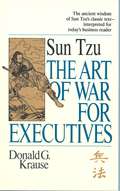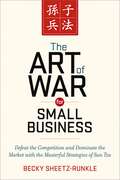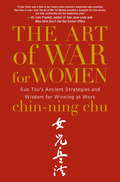- Table View
- List View
The Art of Strategy: Sun Tzu, Michael Porter, and Beyond
by Hwy-Chang MoonWhen it comes to strategy, how should we define victory? For centuries, Eastern and Western thinkers have grappled with this question, offering different answers. What can we learn from this difference? In The Art of Strategy, Moon provides a novel and systematic integration of the two dominant frameworks of the East and West: Sun Tzu's military strategy and Michael Porter's business strategy. This unlikely combination of thinking suggests an innovative extension of our understanding and practice of strategy, which will appeal to scholars, students, practitioners and general readers with an interest in strategy. By aligning the perspectives of these two great thinkers, Moon argues that true winning is about maximizing and optimizing overall value for all engaged stakeholders, and this requires a more efficient approach to strategy.
The Art of Structuring: Bridging the Gap Between Information Systems Research and Practice
by Armin Stein Katrin Bergener Michael RäckersStructuring, or, as it is referred to in the title of this book, the art of structuring, is one of the core elements in the discipline of Information Systems. While the world is becoming increasingly complex, and a growing number of disciplines are evolving to help make it a better place, structure is what is needed in order to understand and combine the various perspectives and approaches involved. Structure is the essential component that allows us to bridge the gaps between these different worlds, and offers a medium for communication and exchange. The contributions in this book build these bridges, which are vital in order to communicate between different worlds of thought and methodology – be it between Information Systems (IS) research and practice, or between IS research and other research disciplines. They describe how structuring can be and should be done so as to foster communication and collaboration. The topics covered reflect various layers of structure that can serve as bridges: models, processes, data, organizations, and technologies. In turn, these aspects are complemented by visionary outlooks on how structure influences the field.
The Art of Successful Brand Collaborations: Partnerships with Artists, Designers, Museums, Territories, Sports, Celebrities, Science, Good Cause…and More
by Géraldine Michel Reine WillingBrand collaborations are widely considered the art of the perfect match. This book is a guide to understanding the process of brand collaborations and explains the key factors of success to build specific forms of collaborations between diverse partners. The Art of Successful Brand Collaborations gives tangible examples of partnerships between various kinds of internationally renowned artists, celebrities, brands and companies such as Coca-Cola, Louis Vuitton, Puma, David Beckham and Pharrell Williams. In this vivid study, the academic and practitioner author team outline deep knowledge about the advantages and economic benefits of this marketing strategy. This includes additional meaning, improvement of the brand image, attracting new customers within different target groups and the development of the brand in new markets. Filled with interviews from practitioners and vital academic and professional insights, this book is an essential guide for brand managers, professors and students to better understand and successfully implement the process of brand collaborations.
The Art of Sustainable Performance: A Model for Recruiting, Selection, and Professional Development (SpringerBriefs in Business)
by Bas KoddenThis open access book revisits common notions on how to select and recruit the right employees. It reveals that the secret of successful individuals and teams lies in a combination of talent and four important performance indicators, offering an innovative approach that companies can fruitfully adopt. Bas Kodden has studied key performance indicators among over 1,100 executives, senior staff and professionals, including 50 CEOs from leading Dutch companies. His findings put the present recruitment and selection procedures used by many prominent companies in a new light. Moreover, the book not only addresses theory; it also offers a practically applicable model for recruitment, selection and professional development. In closing, the book includes a variety of questionnaires and checklists for HR professionals and executives whose goal is to build sustainable and successful teams and organizations.
The Art of Systems Architecting (Systems Engineering)
by Mark W. MaierIf engineering is the art and science of technical problem solving, systems architecting happens when you don't yet know what the problem is. The third edition of a highly respected bestseller, The Art of Systems Architecting provides in-depth coverage of the least understood part of systems design: moving from a vague concept and limited resources
The Art of Trading: A Complete Guide to Trading the Australian Markets
by Christopher TateA comprehensive private trader? guide to the Australian markets. This is the second edition of the hugely successful Art of Trading, by high-profile private trader and author Chris Tate. The first edition sold 20,000 copies. Fully revised and updated, this second edition includes information on charting and technical analysis, money management and risk management.
The Art of Trend Trading
by Michael ParnessLook inward for the missing piece to your trading strategy The Art of Trend Trading bucks the trend of technicality to show readers how instinct and strategy can unite to bring about consistent investment success. Rather than diving ever-deeper into the overdone world of complicated modeling and forecasting techniques, trader, CEO, and bestselling author Michael Parness explains how making intuition a part of your investment strategy tends to result in more long-term profit. Using animal spirits as a metaphor and tool, Parness helps readers understand how their natural tendencies may run counter to their strategy, and how this dichotomy may be the shackle holding them back from true market success. Readers will learn how this perspective lifted Parness from homelessness to making millions in both Bull and Bear markets, and will start developing their own market instinct as they refine and tune into their own natural intuition. Everyone's looking for the "ultimate" system, a way to "game the market" and uncover the "secret" to successful investing. Over the years, Parness has observed that the best traders - those who consistently make money - are the ones that use instinct and intuition, as well as strategy. This book shows you how to identify the natural trader within, and use your gut to inform an ever-evolving investment plan. Follow the author's journey from homelessness to millionaire Identify and understand your own strengths and weaknesses Develop your instinct alongside your strategy Take a lesson from traders making consistent money There's no substitute for good strategy, but it's no secret that some strategies seem to be more profitable than others. The Art of Trend Trading helps you find that missing piece and turn it into more consistent investment success.
The Art of Uncertainty: How to Navigate Chance, Ignorance, Risk and Luck
by David SpiegelhalterNamed a Best Book of the Year by Forbes and The Economist From our "greatest living statistical communicator" (Tim Harford) comes an invaluable, data-driven guide for understanding—and learning to embrace—risk and uncertainty in our daily lives. How dangerous is our diet? How much of sports falls into the realm of luck? When authorities categorize a given event as “highly likely”—how likely is that, really? Whether we’re trying to decide if the benefits of a new medication are worth the chance of side effects or if artificial intelligence truly threatens humanity, our lives are riddled with uncertainties both everyday and existential—yet it can be difficult to know how to properly weigh all those unknowns. Luckily for us, renowned statistician David Spiegelhalter has spent his career dissecting data to resolve the apparently random and decode the many decisions we face with imperfect information. In The Art of Uncertainty, he shows how we can become better at dealing with what we don’t know to make smarter choices in a world so full of puzzling variables. In lucid, lively prose, Spiegelhalter guides us through the principles of probability, illustrating how they can help us think more analytically about everything from medical advice to sports to climate change forecasts. He demonstrates how taking a mathematical approach to phenomena we might otherwise attribute to fate or luck can help us sort hidden patterns from mere coincidences, better evaluate cause and effect, and predict what’s likely to happen in the future. Along the way, we learn how a misinterpretation of a probability contributed to the infamous Bay of Pigs fiasco, why a ship twice the size of the Titanic sank without a trace, and why we can be so confident that no two properly shuffled decks of cards have ever been in the same order. Sparkling with wit and fascinating real-world examples, this is an essential guide to navigating uncertainty while also retaining the humility to admit what we don’t, or simply cannot, know.
The Art of Useless: Fashion, Media, and Consumer Culture in Contemporary China (Global Chinese Culture)
by Calvin HuiSince embarking on economic reforms in 1978, the People’s Republic of China has also undergone a sweeping cultural reorganization, from proletarian culture under Mao to middle-class consumer culture today. Under these circumstances, how has a Chinese middle class come into being, and how has consumerism become the dominant ideology of an avowedly socialist country? The Art of Useless offers an innovative way to understand China’s unprecedented political-economic, social, and cultural transformations, showing how consumer culture helps anticipate, produce, and shape a new middle-class subjectivity.Examining changing representations of the production and consumption of fashion in documentaries and films, Calvin Hui traces how culture contributes to China’s changing social relations through the cultivation of new identities and sensibilities. He explores the commodity chain of fashion on a transnational scale, from production to consumption to disposal, as well as media portrayals of the intersections of clothing with class, gender, and ethnicity. Hui illuminates key cinematic narratives, such as a factory worker’s desire for a high-quality suit in the 1960s, an intellectual’s longing for fashionable clothes in the 1980s, and a white-collar woman’s craving for brand-name commodities in the 2000s. He considers how documentary films depict the undersides of consumption—exploited laborers who fantasize about the products they manufacture as well as the accumulation of waste and its disposal—revealing how global capitalism renders migrant factory workers, scavengers, and garbage invisible.A highly interdisciplinary work that combines theoretical nuance with masterful close analyses, The Art of Useless is an innovative rethinking of the emergence of China’s middle-class consumer culture.
The Art of Value Investing
by Whitney Tilson John HeinsSays Bill Ackman of Pershing Square Capital Management about The Art of Value Investing: "I learned the investment business largely from the work and thinking of other investors. The Art of Value Investing is a thoughtfully organized compilation of some of the best investment insights I have ever read. Read this book with care. It will be one of the highest-return investments you will ever make. " Based on interviews with the world's most-successful value investors, The Art of Value Investing offers a comprehensive set of answers to the questions every equity money manager should have thought through clearly before holding himself or herself out as a worthy steward of other people's money. What market inefficiencies will I try to exploit? How will I generate ideas? What will be my geographic focus? What analytical edge will I hope to have? What valuation methodologies will I use? What time horizon will I typically employ? How many stocks will I own? How specifically will I decide to buy or sell? Will I hedge, and how? How will I keep my emotions from getting the best of me? Who should read The Art of Value Investing? It is as vital a resource for the just starting out investor as for the sophisticated professional one. The former will find a comprehensive guidebook for defining a sound investment strategy from A-to-Z; the latter will find all aspects of his or her existing practice challenged or reconfirmed by the provocative thinking of their most-successful peers. It also is a must read for any investor - institutional or individual - charged with choosing the best managers for the money they are allocating to equities. Choosing the right managers requires knowing all the right questions to ask as well as the answers worthy of respect and attention - both of which are delivered in The Art of Value Investing.
The Art of Victory: Strategies for Personal Success and Global Survival in a Changing World
by Gregory R. CopleyIn a changing world, conflict is inevitable -- but defeat is not. In fact, by understanding how civilizations and societies naturally evolve, one can not only adapt but flourish, and emerge better than ever in any sphere: personal, professional, or global. Award-winning historian and global strategist Gregory R. Copley draws from decades of experience advising political and military leadership to offer a holistic and balanced view of simple success strategies, with 28 maxims for survival and prosperity in the advancing wave of social, technological, and environmental change we now face. Not since Sun-tzu's The Art of War has a blueprint for success offered so much to so many, with lessons that speak to every walk of life. In The Art of Victory, we learn that victory itself begins with a single act. . . is the principal goal of a society. . . is beyond the power of any individual. . . is never created or sustained by weakness. . . can never be total, and this is its beauty. . . cannot be bought or sold; it can only be won. . . and much more. From the halls of political power to the corporate boardroom to the living room, the timeless lessons in The Art of Victory will ensure that individuals and societies not just survive but thrive in the new century.
The Art of Virtue: Ben Franklin's Formula for Successful Living
by Benjamin FranklinAn indispensable guide to right living from a Founding Father. Benjamin Franklin, one of our nation’s most revered founders, was a man of uncommonly fine common sense. Although he was never able to finish his project of compiling a comprehensive compendium of practical wisdom, he was able to lay down the beginnings of this work in his later writings. Collected within this volume are Franklin's writings organized around his timeless philosophy on living well, containing his thoughts on justice, moderation, chastity, and more. The Art of Virtue is a simple, concise, and illuminating guide to living a virtuous and fulfilling life. Perfect for readers young and old alike.
The Art of Voice Acting: The Craft and Business of Performing for Voiceover (Fifth Edition)
by James AlburgerFrom basic acting techniques and exercises for keeping the voice in top condition, to marketing and promotion of the actor, The Art of Voice Actingcovers it all. Now in its fifth edition, this essential book is packed with expert advice on job opportunities and career management tips; it is the ideal resource for anyone wanting to maximize their success in the industry. Complete with a companion website and QR codes that link directly to additional material such as audio for every script included in the book, more exercises, and voice relaxation techniques, this is the complete package that gives voiceover actors, and those in related fields, a clear, no-nonsense introduction to the business and art of voice acting. New and updated in this edition: All new scripts and voice exercises More voice and acting techniques Coverage of new trends, including online demos and online auditions Additional coverage of audiobooks and new information on home studio technology All new contributions from some of the top voice talent in the world
The Art of Vulture Investing
by George J. Schultze Janet LewisA detailed and compelling look at distressed securities investing in today's market In the corporate world, "vulture" investors in distressed securities serve the same cleanup function as vultures do in the natural world: they deal with failing companies, digest bad debt, and mop up after bankruptcies. Since this market's structural and legal complexities create greater inefficiencies than in other investment fields, it's a style of investing that can make money during both booms and busts. While recent economic carnage has made opportunities for vulture investors, more convoluted bankruptcies, conflicts of interest, and even government intervention have made this arena harder to negotiate. Nobody understands this better than author George Schultze, founder of Schultze Asset Management. During his successful career as a vulture investor, he's learned a number of lessons and developed an investment philosophy that has served him well. Now, in The Art of Vulture Investing, Schultze shares his valuable insights and experiences with you. Engaging and informative, this reliable guide offers a bird's-eye into the opportunities and risks associated with vulture investing. And while it may not always be pretty, you'll see exactly why this process is necessary for our economic ecosystem. Throughout this book, Schultze explains the theory and strategy of vulture investing in clear and lively prose, illustrating each concept with examples from his own varied experience that show how the landscape has changed in recent years. Offers valuable information on distressed securities investing since the 2007-2009 financial crisis Examines the opportunities and dilemmas for modern vulture investors Includes in-depth case studies of high-profile bankruptcies, including those of Chrysler Automotive and Tropicana Casinos and Resorts By its very nature, investing in distressed companies can be a complicated and risky business. But once the dust settles, these investments can yield extraordinary profits. The Art of Vulture Investing puts this discipline in perspective and shows you how to excel at this difficult, yet rewarding, endeavor.
The Art of Waking People Up: Cultivating Awareness and Authenticity at Work (J-b Warren Bennis Ser.)
by Joan Goldsmith Kenneth ClokeIn The Art of Waking People Up authors Kenneth Cloke and Joan Goldsmith draw on more than thirty years of practical experience with hundreds of organizations-- from Fortune 500 companies to government agencies, schools, and nonprofits-- to reveal new ways of giving and receiving feedback that maximize personal and organizational change and foster lifelong learning. They show how organizations can develop the systems, processes, techniques, and relationships that affirm, rather than undermine, the intelligence and humanity of their employees. This important resource is filled with the necessary tools, interventions, and strategies managers can use to encourage their employees to speak, hear, absorb, and use the information they need to improve the way they work.
The Art of War
by James Clavell Sun TzuIf you know the enemy and know yourself, you need not fear the result of a hundred battles. If you know yourself but not the enemy, for every victory gained you will also suffer a defeat. If you know neither the enemy nor yourself, you will succumb in every battle....These are the words of ancient Chinese philosopher Sun Tzu, whose now-classic treatise, The Art of War, was written more than 2,500 years ago. Originally a text for victory on the battlefield, the book has vastly transcended its original purpose.Here is a seminal work on the philosophy of successful leadership that is as applicable to contemporary business as it is to war. Today many leading American business schools use the text as required reading for aspiring managers, and even Oliver Stone's award-winning film Wall Street cites The Art of War as a guide to those who strive for success.Now acclaimed novelist James Clavell, for whom Sun Tzu's writing has been an inspiration, gives us a newly edited Art of War. Author of the best-selling Asian saga consisting of Shogun, Tai-Pan, Gai-jin, King Rat, Noble House, and Whirlwind, Clavell first heard about Sun Tzu in Hong Kong in 1977, and since then The Art Of War has been his constant companion--he refers to it frequently in Noble House. He has taken a 1910 translation of the book and clarified it for the contemporary reader. This new edition of The Art Of War is an extraordinary book made even more relevant by an extraordinary editor.
The Art of War
by Sun Tzu Tom Butler-BowdonThe original and bestselling leadership book!Sun Tzu's ideas on survival and success have been read across the world for centuries. Today they can still be applied to business, politics and life. The Art of War demonstrates how to win without conflict. It shows that with enough intelligence and planning, it is possible to conquer with a minimum of force and little destruction.This luxury hardback edition includes an introduction by Tom Butler-Bowdon that draws out lessons for managers and business leaders, and highlights the power of Sun Tzu's thinking in everyday life.
The Art of War (Penguin Modern Classics #909)
by Sun TzuRegarded as the world's oldest military treatise, this compact volume has instructed officers and tacticians for more than 2,000 years. From its origins in China, The Art of War traveled the world to inform the strategies of Napoleon and World War II generals. More recently, it has taken on a new life as a guide to competing successfully in business, law, and sports.All of The Art of War's concepts retain their value to modern readers, from the prudence of circumventing a strong opponent and taking advantage of a weak one to the wisdom of preparedness and flexibility. Other topics include strategy, tactics, maneuvering, communications, the treatment of soldiers, and the worth of well-trained officers. History enthusiasts, business thought leaders, and anyone intrigued by competition and rivalry will appreciate this elegant edition of the classic work.
The Art of War (Shambhala Library #909)
by Sun TzuConflict is an inevitable part of life, according to this ancient Chinese classic of strategy, but everything necessary to deal with conflict wisely, honorably, victoriously, is already present within us. Compiled more than two thousand years ago by a mysterious warrior-philosopher, The Art of War is still perhaps the most prestigious and influential book of strategy in the world, as eagerly studied in Asia by modern politicians and executives as it has been by military leaders since ancient times. As a study of the anatomy of organizations in conflict, The Art of War applies to competition and conflict in general, on every level from the interpersonal to the international. Its aim is invincibility, victory without battle, and unassailable strength through understanding the physics, politics, and psychology of conflict.
The Art of War (Skylight Illuminations Ser.)
by Sun Tzu Thomas ClearySun Tzu's Art of War, compiled more than two thousand years ago, is a study of the anatomy of organizations in conflict. It is perhaps the most prestigious and influential book of strategy in the world today. Now, this unique volume brings together the essential versions of Sun Tzu's text, along with illuminating commentaries and auxiliary texts written by distinguished strategists. The translations, by the renowned translator Thomas Cleary, have all been published previously in book form, except for The Silver Sparrow Art of War, which is available here for the first time. This comprehensive collection contains: The Art of War: This edition of Sun Tzu's text includes the classic collection of commentaries by eleven interpreters. Mastering the Art of War: Consisting of essays by two prominent statesmen-generals of Han dynasty China, Zhuge Liang and Liu Ji, this book develops the strategies of Sun Tzu's classic into a complete handbook of organization and leadership. It draws on episodes from Chinese history to show in concrete terms the proper use of Sun Tzu's principles. The Lost Art of War: Written more than one hundred years after Sun Tzu's text, by Sun Bin, a linear descendant of Sun Tzu, this classic of political and military strategy is faithful to the principles of The Art of War, while developing their practical application much further. The Silver Sparrow Art of War: A version of Sun Tzu's Art of War based on a manuscript of the classic text discovered at a Chinese archeological site in China's Shandong Province in 1972, which contains previously unknown fragments.
The Art of War Visualized: The Sun Tzu Classic in Charts and Graphs
by Jessica HagyIt’s the perfect meeting of minds. One, a general whose epigrammatic lessons on strategy offer timeless insight and wisdom. And the other, a visual thinker whose succinct diagrams and charts give readers a fresh way of looking at life’s challenges and opportunities. A Bronze Age/Information Age marriage of Sun Tzu and Jessica Hagy, The Art of War Visualized is an inspired mash-up, a work that completely reenergizes the perennial bestseller and makes it accessible to a new generation of students, entrepreneurs, business leaders, artists, seekers, lovers of games and game theory, and anyone else who knows the value of seeking guidance for the future in the teachings of the past. It’s as if Sun Tzu got a 21st-century do-over. Author and illustrator of How to Be Interesting, Jessica Hagy is a cutting-edge thinker whose language—comprising circles, arrows, and lines and the well-chosen word or two—makes her an ideal philosopher for our ever-more-visual culture. Her charts and diagrams are deceptively simple, often funny, and always thought-provoking. She knows how to communicate not only ideas but the complex process of thinking itself, complete with its twists and surprises. For The Art of War Visualized, she presents her vision in evocative ink-brush art and bold typography. The result is page after page in which each passage of the complete canonical text (in its best-known Lionel Giles translation) is visually interpreted in a singular diagram, chart, or other illustration—transforming, reenergizing, and making the classic dazzlingly accessible for a new generation of readers.
The Art of War for Executives
by Krause Donald G.The first book to provide a clear easy-to-follow interpretation of Sun Tzu's classic document. The Art of War for Executives shows how to win on the battlefield of business.
The Art of War for Executives: Sun Tzu's Classic Text Interpreted for Today's Business Reader
by Donald G. KrauseFor years, business schools and professional consultants have turned to Sun Tzu's 2,500-year-old Chinese text for its invaluable commentary on such topics as leadership, strategy, organisation, competition and cooperation. Now the wisdom of Sun Tzu's The Art of War is made accessible to the modern reader. Not simply a new translation, this is the first book to provide a clear, easy-to-follow interpretation of the classic document. The Art of War for Executives reveals the brilliance of Sun Tzu - and shows how to win on the battlefield of modern business. The tone and insight of the original classic remain, whilst incorperating the ideas of contemporary business philosophers, like Peters, Drucker and Bennis. Here at last is an accessible interpretation of Sun Tzu's The Art of War incorperating modern business lessons to make this classic text relevant and readable for today's executive facing strategic and competitive challenges.
The Art of War for Small Business: Defeat the Competition and Dominate the Market with the Masterful Strategies of Sun Tzu
by Becky Sheetz-RunkleSun Tzu's ancient The Art of War has inspired military, political, and business leaders across the world with its brilliant strategies for prevailing against opponents. At the core of this classic treatise is the message that sledgehammer approaches can backfire, and size alone does not guarantee wins. Strategy, positioning, planning, leadership--all play equally significant roles, making Sun Tzu's teachings perfect for small business owners and entrepreneurs entrenched in fierce competition for customers, market share, talent . . . for their very survival. The Art of War for Small Business is the first book to apply Sun Tzu's wisdom to the small business arena. Featuring inspiring examples of entrepreneurial success, the book's 12 timeless lessons reveal how to: Choose the right ground for your battles Prepare without falling prey to paralysis Leverage strengths while overcoming limitations Strike competitors' weakest points and seize every opportunity Focus priorities and resources on conquering key challenges Go where the enemy is not Build and leverage strategic alliances Big companies may deploy overwhelming forces, but small companies can outsmart, outmaneuver, and outstrategize larger adversaries to capture crucial sectors, serve unmet needs, and emerge victorious.
The Art of War for Women
by Chin-Ning ChuForget everything you think you know about strength, strategy and success. This brilliant adaptation of the ancient masterpiece The Art of War shows women how to use Sun Tzu's philosophy to win in every aspect of life.Would you like to transform your weaknesses into strengths? Succeed at work without compromising your ethics? Integrate your style and personal philosophy into every action you take? If so, this book is for you. In The Art of War for Women, bestselling author Chin-Ning Chu brings the eternal wisdom of philosopher-general Sun Tzu to women looking to gain a better understanding of who they are - and, more importantly, who they want to be. In the West, when we think of war, we imagine battle, casualties, brutality. But Sun Tzu, the man who wrote the Art of War some 2,500 years ago, was Chinese, and the Chinese think of war differently than we do in the West. In their view, war does not revolve around fighting. It is about determining the most efficient way of gaining victory with the least amount of conflict.That's why Sun Tzu's Art of War is particularly appropriate for women. Let's face it, as intelligent and accomplished as we may be, there are very few of us who are comfortable with direct confrontation or situations where our triumph means someone else's defeat. We are natural negotiators and problem solvers; most of us prefer win-win situations to those in which winner-takes-all.But there is another reason The Art of War is particularly appropriate for us. Although Sun Tzu's book is about the application of strategies, every one of those strategies begins with having a deep understanding of the people and the world around us. They also require us to understand ourselves - our strengths and weaknesses, our goals and fears. In other words, the aim is not to apply a series of rules coldly and dispassionately, but rather to integrate ourselves and our unique talents into the strategies we will employ. This is not a feel-good book. (But you will feel good after reading it.) It is not a motivational book. (But you will be motivated to achieve what you want, once you are done.) Ultimately, its purpose it to provide women with the strategies we all need to overcome the obstacles that stand in the way of our goals and dreams. Sun Tzu's Art of War is the most influential book on strategy ever published, selling tens of millions of copies worldwide in several editions. Written by one of today's foremost authorities on Sun Tzu, The Art of War for Women is sure to become a classic in its own right.
